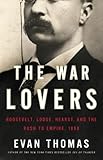
Like most reviewers, I found THE WAR LOVERS highly enjoyable, both entertaining and educational, with its interesting insights into the personalities and political machinations of late 19th century America. Evan Thomas's writing is excellent, being engaging and imaginative, as he concisely details the history and influence of his star characters. This book, despite being quite long and full of interesting history, is a rather easy read. Even those with very little foreknowledge of the time and characters will feel comfortable reading this, as Evans does an excellent job of giving all pertinent back-story and keeping the focus on the basics. I have new found respect for the remarkable writing skills of Evan Thomas. This book also contains many nice black-and-white photos throughout, further connecting the reader to the time and maintaining the accessibility of the subjects.
THE WAR LOVERS is really a history told through limited biographies of some of the most powerful American Movers of the late 19th century. Theodore Roosevelt, Henry Cabot Lodge, William Randolph Hearst, William James, and Thomas Reed provide a broad spectrum upper-crust America's thoughts and attitudes during this time. Evan Thomas presents Teddy Roosevelt (the real star of the book) in a strikingly negative light, casting him as arrogant, bullying, not-always-truthful, and sometimes downright crazy. The other characters are given a more kind treatment here, but nothing is sugar-coated. As these powerful figures debate the future of America and its role in the world, the reader gets interesting insights into politics, human nature, the rich and powerful, and America of ~1900. The development of Manifest Destiny and the White Man's Burden are fascinating subjects of world history, and this book provides a wonderfully unique (but limited) glimpse into this period.
As others have observed, the blatant and almost snide political daggers contained within this book are unnecessary, distracting, and off-putting. I suspect that selling books provided the primary motivation for putting the silly comments about Iraq and Dick Cheney on the back cover and in the editor's comments. Really disappointing to see such senseless (and baseless) political jabbing into what is really a wonderfully-done and insightful book on history. And while I don't want to justify the attempts to link the invasions of Cuba and Iraq with a response, I do want to point out one glaring difference (among many). In 1898, American leaders didn't think that Cubans were fit for self rule (because of racism), while in 2003 American leaders were maybe over-confident in Iraqi's ability of self rule. This meant we planned on staying in Cuba as hegemon, while in Iraq, we had hoped to not stay.
One other comment. Thomas here claims that part of the reasons behind pushing for war (by Teddy and Cabot) was to unify the country. He fails to discuss the fact that in many ways that aspect of their plan succeeded, at least temporarily.
Overall, this is a very enjoyable book. Especially for history-lovers. This one will keep your attention and further develop your knowledge of this interesting part of American history. Just ignore the irrelevant political jabs. Recommended!
Get more detail about The War Lovers: Roosevelt, Lodge, Hearst, and the Rush to Empire, 1898.
No comments:
Post a Comment